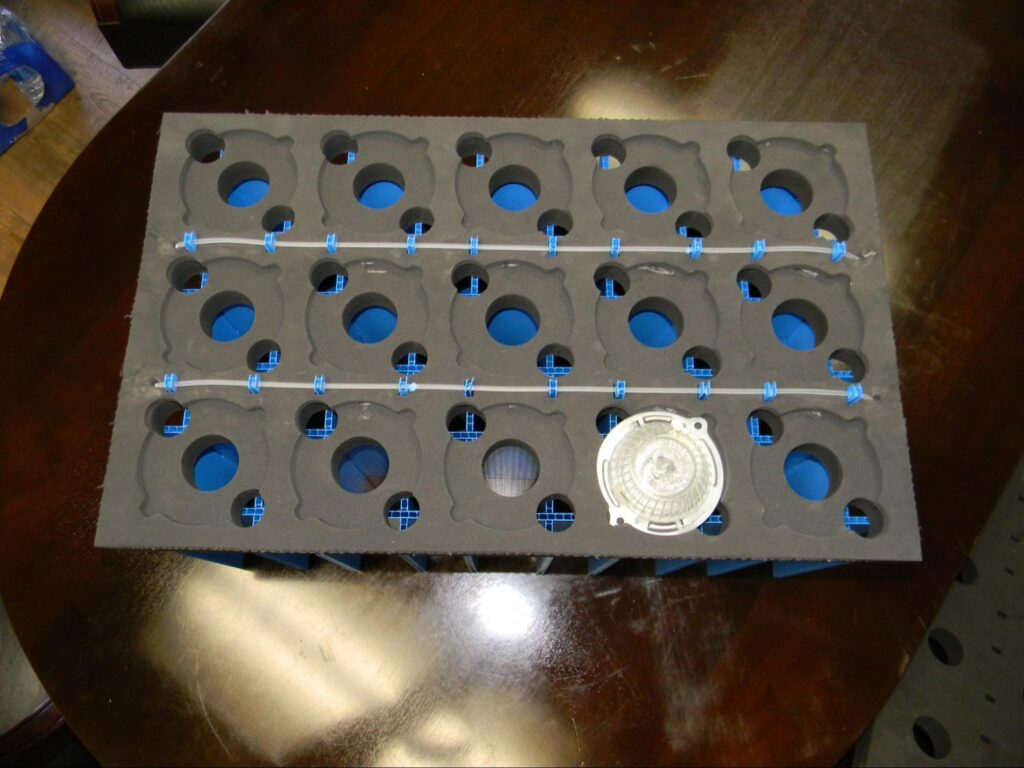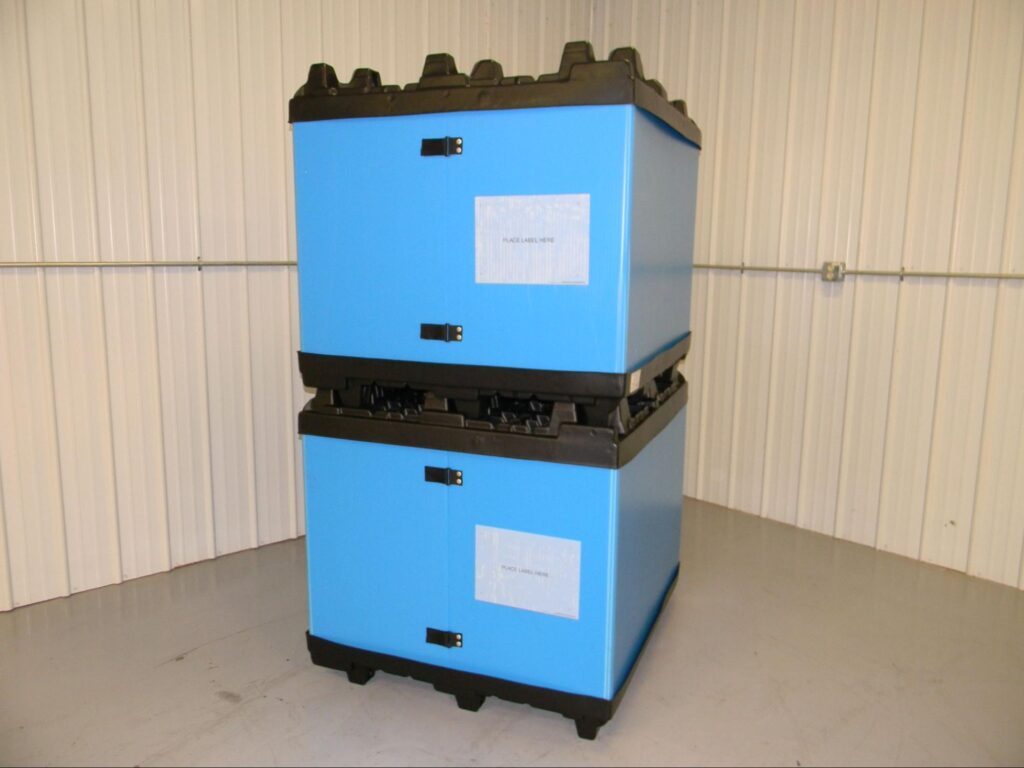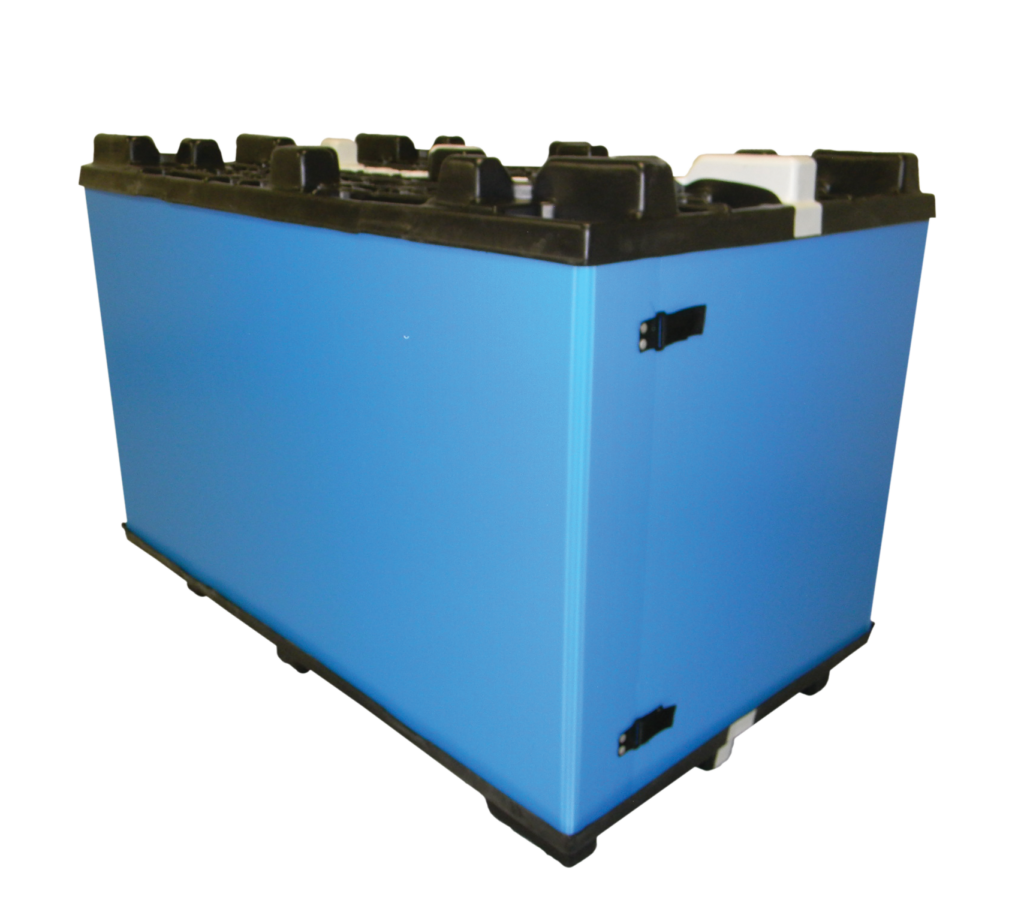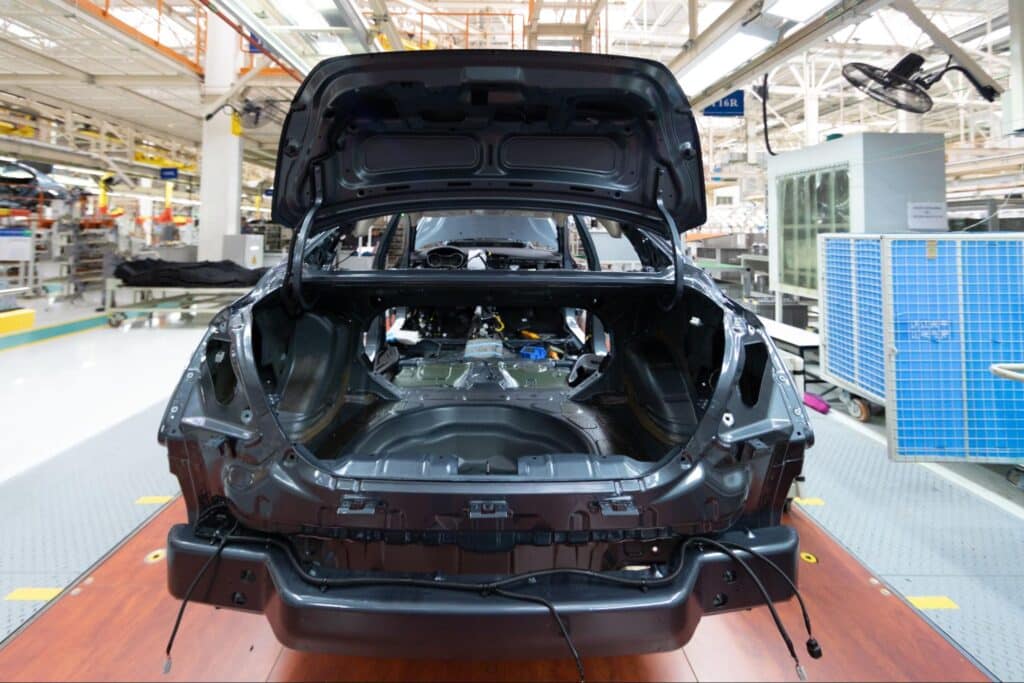The automotive industry relies on robust and innovative packaging solutions to protect components during transportation and storage while also meeting rising environmental standards. Traditional methods using single-use plastics and disposable materials contribute to waste and inefficiency. Sustainable packaging offers a promising alternative through reusable, recyclable, and eco-friendly materials that enhance both operational efficiency and environmental stewardship.
In this article, we explore key sustainable packaging options—corrugated plastic containers, foam packaging assemblies, metal racks, textile dunnage, and sleeve packs—and discuss how they address industry challenges while supporting long-term sustainability goals. We also examine emerging innovations, operational strategies, future trends that help automotive companies transition to more sustainable practices, and how Universal Package’s commitment to durable, customizable, and eco-friendly solutions can enable success.
Packaging Materials in the Automotive Industry
Effective packaging is essential for safeguarding the diverse range of automotive components. With parts spanning delicate electronics to heavy engine assemblies, packaging must be durable, adaptable, and sustainable to withstand complex supply chains. As environmental regulations tighten and consumer awareness grows, automotive companies are shifting toward packaging solutions that protect products while reducing their ecological impact.
Balancing cost efficiency and sustainability prompts companies to invest in advanced materials and solutions. This shift is driven both by environmental concerns and the operational benefits of enhanced durability, reduced maintenance, and improved logistics efficiency. By phasing out disposable packaging, businesses can reduce ongoing waste management costs and lower their carbon footprint throughout the supply chain.
With a focus on reducing waste and energy consumption, automotive companies are transitioning toward reusable packaging systems. This shift toward sustainable packaging not only supports environmental goals but can also strengthen operational performance and achieve long-term cost savings.
Corrugated Plastic Containers
Corrugated plastic containers combine durability with a lightweight design, making them an attractive and environmentally conscious option for automotive packaging.
Features
- Lightweight yet durable construction that helps reduce shipping costs.
- Resistance to water, chemicals, and oil, suitable for industrial environments.
- Reusable and customizable to accommodate a variety of components.
Benefits
These containers effectively protect automotive parts—from electronic modules to engine components—offering cost savings over multiple transport cycles. Their stackable design maximizes storage efficiency while minimizing waste. By repeatedly using these containers, manufacturers reduce the reliance on short-lived alternatives, supporting a more circular approach in supply chain management.
Foam Packaging Assemblies

Providing tailored cushioning for sensitive automotive parts, foam packaging assemblies absorb shocks and reduce vibrations, safeguarding products throughout transit and storage.
Features
- Customizable inserts that fit components of varied shapes and sizes.
- Multiple foam options, such as polyethylene and polyurethane, tailored for diverse protection needs.
- Excellent shock and vibration absorption for fragile parts.
Benefits
Foam assemblies help protect delicate electronics, painted finishes, and precision parts by reducing shifting during transit. Recent advances have introduced foams with improved recyclability, minimizing environmental impact. The ability to reuse foam assemblies across multiple shipments further reduces material consumption and waste, aligning with sustainable best practices.
Metal Racks
Metal racks offer heavy-duty support critical for handling and storing large or heavy automotive parts. For instance, steel racks designed for high-load applications are ideally suited for securing components such as transmissions and engine assemblies.
Features
- Exceptional strength and durability for high-load or oversized components.
- Customizable designs, including dividers and compartments, to stabilize parts.
- Compatibility with automated handling systems to streamline operations.
Benefits
Metal racks lend themselves to efficient workflow by withstanding repeated use and tough handling conditions. Their secure designs help prevent product shifting and potential damage, reducing overall waste. By using racks multiple times, companies can realize significant cost savings over single-use alternatives and bolster safe handling protocols across distribution networks.
Textile Dunnage
Providing gentle yet effective protection for delicate components, textile dunnage is a reusable cushioning solution that cradles sensitive items during transport.
Features
- Soft, cushioned material to reduce scratches and abrasions.
- Flexible designs to accommodate varied shapes and sizes.
- Washable and reusable, replacing single-use dunnage like bubble wrap.
Benefits
Textile dunnage improves sustainability by reducing reliance on one-time-use packaging. Delicate parts are safeguarded without generating additional plastic waste. Washability further extends the product lifecycle, lowering both environmental impact and long-term costs.
Sleeve Packs

Offering an innovative, space-saving solution, sleeve packs enhance both storage and transportation efficiency.
Features
- Collapsible structure that reduces empty container volume.
- Lightweight materials for convenient handling.
- Stackable design to optimize warehouse and transport space.
Benefits
Simple loading and unloading, combined with reusability, make sleeve packs highly cost-effective. Because they shrink in size when empty, sleeve packs save warehouse space and reduce transport fuel consumption. Their customizable nature can adapt to a range of automotive components, making them relevant for companies seeking to minimize waste and streamline supply chains.
The Role of Effective Packaging in Automotive Component Transportation
Packaging plays a critical role in safeguarding automotive parts throughout the extended supply chain. Its primary functions include:
- Prevents Damage: Shields vulnerable parts from impact, vibration, and abrasion.
- Optimizes Logistics: Features like stackability and collapsibility improve space utilization.
- Enhances Efficiency: Streamlines handling and maximizes throughput, reducing overall costs.
- Supports Sustainability Goals: Reusable systems integrate seamlessly with circular economy principles, lowering long-term waste generation.
Beyond delivering protection, high-quality packaging reflects a company’s commitment to environmental responsibility, improving brand reputation and customer satisfaction.
Environmental Impact of Traditional Automotive Packaging Materials
Legacy materials such as single-use plastics and disposable foams drive up material consumption and landfill waste. Although they may appear inexpensive initially, they incur hidden costs related to replacement, disposal, and environmental harm. Moreover, as consumer and regulatory pressures increase, reverting to disposable materials can negatively impact a company’s public image.
By contrast, greener choices like recyclable plastic containers or durable foam inserts help companies align with eco-conscious guidelines and foster a more sustainable ethos. Such solutions often lead to lower overall costs once the full life cycle of the packaging is accounted for.
Sustainable Packaging Initiatives in the Automotive Sector
With stronger environmental regulations and shifting market expectations, automotive companies are implementing diverse sustainability initiatives in packaging:
- Reusable Packaging Systems: Systematic adoption of corrugated plastic containers, textile dunnage, and metal racks to reduce reliance on disposables.
- Biodegradable and Recycled Materials: Cutting-edge foam technologies and textiles that incorporate recycled fibers or decompose more easily.
- Collaborative Efforts: Partnerships between manufacturers and suppliers to design efficient, eco-friendly transportation and storage systems.
These concerted efforts highlight a broader push towards eco-responsibility, with reusable packaging at the forefront of cost-effective and sustainable supply chain management.
Innovative Technologies in Sustainable Packaging
Technological advancements continue to reshape automotive packaging:
- Automation: Robotics and other automated systems reduce labor costs, minimize damage, and ensure that each package is optimally filled.
- Design Optimization Software: 3D modeling and simulation tools allow for precise sizing and configuration, reducing wasted materials.
- Blockchain for Traceability: By tracking packaging from production to disposal, companies gain a transparent overview of reuse cycles and potential inefficiencies.
In the near future, bio-based and compostable materials are likely to extend the range of green solutions, supported by ongoing research into new polymers and alternative plant-based resources. While more speculative innovations—such as self-repairing or self-cleaning materials—are still being developed, they illustrate the transformative potential within the packaging domain.
Operational Challenges and Considerations with Sustainable Packaging in the Automotive Industry
Shifting to eco-friendly packaging systems presents unique challenges for automotive companies. These include:
- Initial Investment: Acquiring reusable containers or specialized foam can be more expensive initially, though life cycle savings often offset higher upfront costs.
- Supply Chain Adaptation: Implementation of reverse logistics processes to retrieve programmable totes, racks, and dunnage requires careful planning.
- Quality Control and Maintenance: Durable solutions must be regularly inspected and maintained to ensure they continue to protect components effectively.
- Staff Training: Employees need guidance to understand new protocols, handle reusable packaging systems correctly, and maintain them for repeated use.
Overcoming these obstacles typically involves a coordinated approach that integrates logistics, production, and procurement teams to devise the most effective strategies.
Implementing a Sustainable Packaging Roadmap
Automotive organizations can transition to greener packaging by formulating a strategic roadmap that includes:
- Assessment and Audit: Evaluate existing packaging practices and identify areas for improvement, focusing on high-waste components.
- Pilot Projects: Introduce reusable systems like corrugated plastic containers in a specific segment or facility to test viability and measure returns.
- Cross-Functional Collaboration: Engage diverse teams (including R&D, logistics, and quality control) to develop integrated solutions that address all stages of the supply chain.
- Continuous Improvement: Monitor performance metrics—like cost savings, damage rates, and environmental impact—and refine processes to achieve higher sustainability benchmarks.
This roadmap helps companies maximize the technical and financial benefits of eco-friendly packaging while bolstering their brand reputation.
Future Trends in Sustainable Automotive Packaging
Over the next decade, developments in materials science, logistics, and regulatory frameworks will likely accelerate adoption of sustainable packaging. The emergence of stronger yet lighter bio-based polymers, deeper integration of automation, and growth in data analytics for better packaging lifecycle tracking are poised to reshape the automotive sector. While experimental concepts like self-healing packaging remain on the horizon, companies investing in green innovations today will be well-positioned to embrace these breakthroughs.
Collaborative Approaches to Sustainability
Sustainability efforts thrive most when multiple stakeholders—manufacturers, suppliers, retailers, and logistics partners—work together to streamline packaging strategies. Open forums and consortia that allow sampling of best practices, co-development of reusable packaging standards, and collaborative testing help advance shared environmental goals. Looking beyond immediate cost savings, this kind of synergy also fosters a supply chain community dedicated to minimizing waste and pollution on a large scale.
Universal Package’s Reusable and Sustainable Packaging Solutions
Universal Package specializes in custom-designed industrial packaging and material handling solutions, with a focus on reusability and sustainability. Serving industries as diverse as automotive, appliance, medical, and electronics, the company offers a comprehensive portfolio of products and services aligned with eco-friendly practices:
- Custom Products: From corrugated plastic containers, foam assemblies, and textile dunnage to sleeve packs and steel racks, each solution is tailored to meet stringent automotive standards. These customizable products protect parts while contributing to a cleaner environment through reduced waste.
- Standard Products: Universal Package also provides convenient options such as hand totes and plastic bulk containers, which are easily integrated into existing supply chains.
- Services That Extend Reusability: Their clean & repair service maintains packaging performance over multiple cycles, minimizing material disposal. Meanwhile, lease & rental options help companies adopt reusable packaging without high upfront costs, allowing them to scale quickly and sustainably.
With a commitment to durability, customizability, and eco-friendliness, Universal Package helps automotive companies optimize their logistics while significantly reducing waste. Their solutions strike the balance between high-quality protection and long-term environmental stewardship, enabling seamless transitions toward a circular economy model.
Transitioning to a Greener Future with Sustainable Automotive Packaging
Sustainable packaging is essential for meeting the demands of operational efficiency and environmental responsibility in the automotive industry. By adopting solutions like corrugated plastic containers, foam packaging assemblies, metal racks, textile dunnage, and sleeve packs, companies can reduce waste, strengthen their supply chains, and achieve long-term cost savings.
Advances in technology, alongside thoughtful implementation practices, are continuing to fuel new innovations in packaging. Making the shift toward eco-friendly materials and designs not only meets evolving regulatory expectations but also fosters a more circular economy, positioning businesses at the forefront of responsible manufacturing.
To take the next step toward greener supply chains, consult Universal Package’s experts on reusable and sustainable automotive packaging. Explore custom solutions designed to enhance durability, reduce waste, and support your organization’s environmental goals. Contact Universal Package today to begin your journey toward innovative, eco-friendly packaging solutions.



